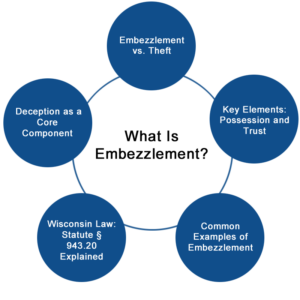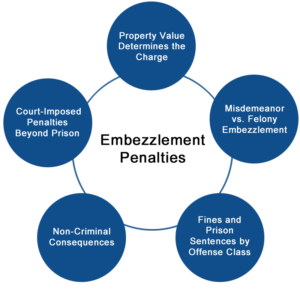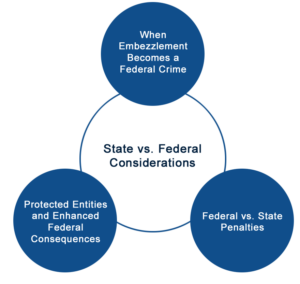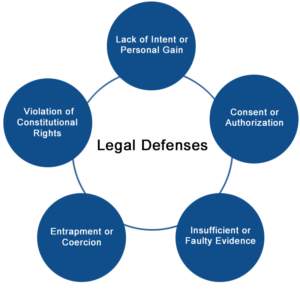Embezzlement in Wisconsin

While the term itself isn’t found anywhere in the law, the act of embezzlement is considered a criminal act of theft under Wisconsin Statute § 943.20. The difference between embezzlement and theft lies largely in the relationship between the thief and their victim. In embezzlement, an employee or an individual that the owner has entrusted with their property takes it without consent for personal gain. This could mean taking money from the company, redirecting funds into personal accounts or otherwise using company resources for personal profit. Regardless, it is theft, and can be prosecuted as such.
Possession and Trust
There are two key elements that define embezzlement: possession and trust.
Possession is what ties embezzlement and theft together, as proving either means proving that the accused took possession of someone else’s property without their consent. The second element, trust, is what sets embezzlement and theft apart. In cases of embezzlement, the accused has been entrusted with the property in question, such as a bank teller or cashier who has been entrusted with the company’s money. This element of trust is why embezzlement generally occurs between employees and employers.
The specific area of the laws surrounding theft that comes closest to describing embezzlement comes in Wisconsin Statute § 943.20(1)(d), criminalizing the act of obtaining property by “intentionally deceiving the person with a false representation which is known to be false, made with intent to defraud, and which does defraud the person to whom it is made.” Deception is how embezzlement occurs, and that deception defines the crime.
 What are the Penalties?
What are the Penalties?
Wisconsin law determines the penalty for theft based on the value of the property that was taken. In the legal sense, property can be nearly anything from physical items like cash or confidential documents to less tangible items like gas, electricity or intellectual property. For classification purposes, the value of the items is based on their market value when the theft occurred or the replacement cost. When the property is something intangible, the court will set the value based on its intrinsic worth. If the accused was a partial owner of the property, that will be weighed into its total.
Once that value has been determined, there are several tiers of fines, prison terms and penalties. Whether the crime is as simple as a cashier skimming money from their register or as complicated as a CFO diverting company money into an offshore account, it is the value of the property that determines the crime.
Theft of property valued at less than $2,500 is considered a Class A Misdemeanor with fines up to $10,000 and jail time up to nine months. If the value of the property is valued at up to $5,000, the charges are elevated to a Class I Felony with fines up to $10,000 and 3 ½ years in prison (consisting of 1 ½ years confinement and two years extended supervision). For theft of up to $10,000, the charge is a Class H Felony with fines up to $10,000 and six years in prison (split between three years of confinement and three years of extended supervision). Theft of up to $100,000 can be considered a Class G Felony with fines up to $25,000 and up to 10 years in prison split evenly between confinement and extended supervision. Anything above $100,000 can be classified as a Class F Felony. One of the most serious levels of crime in the state, it can carry fines up to $25,000 and 12 ½ years in prison (with 7 ½ years of initial confinement and five years of extended supervision.
Beyond jail time and fines, there are the long-lasting consequences of a crime, like loss of professional licensure, reputational damage, a mark on the permanent criminal record and potential civil lawsuits. And that’s on top of the other consequences that the court can bring to bear, including probation, community service, repayment or restation, court costs, and denial of immigration or citizenship.
 Theft from a Financial Institution
Theft from a Financial Institution
Wisconsin law describes theft from a financial institution as its own infraction, as described in Wisconsin Statute § 943.81, stating that any person who “uses, transfers, conceals, or takes possession of money, funds, credits, securities, assets, or property owned by or under the custody or control of a financial institution without authorization from the financial institution” can be prosecuted.
State vs. Federal Embezzlement Considerations
In Wisconsin, embezzlement can be prosecuted as a federal crime, as a state crime, or potentially as both. The majority of cases are handled at the state level, but elements of embezzlement often involve interstate commerce, financial securities or large institutions, allowing them to be elevated to federal jurisdiction. At that point, federal prosecutors can invoke laws relating to securities fraud, antitrust violations, banking regulations or interstate commerce.
These charges are prosecuted primarily under 18 U.S. Code § 641 and its related statutes. As with Wisconsin law, there are various levels of penalties based on the value of the property in question. If the value is less than $1,000, it is considered a misdemeanor with a $100,000 fine and up to a year in prison. Anything above that is considered a felony, carrying fines up to $250,000 for individuals (or $500,000 for organizations) as well as 10 years in federal prison. If the theft comes at the expense of certain protected entities, such as public funds, federally funded programs, employee benefit plans or banks, consequences get even higher. As one example, a person found guilty of embezzling more than $5,000 from a federally funded program could receive 10 years in prison, while embezzling from a bank can carry a $1 million fine and a 30-year prison sentence.
Common Legal Defenses in Embezzlement Cases
While charges of embezzlement are serious, and prosecuted vigorously, there are many ways to defend against them effectively, leading to a dismissal or reduction in charges and in some cases a full acquittal. The key to any of them is timing – the earlier a skilled defense attorney is involved, the better. In one case, a client of Tracey Wood & Associates was accused of both embezzlement and fraud. Our attorneys acted swiftly, negotiating directly with the prosecutor and offering exculpatory evidence. After a quick review of the facts later, the prosecutor agreed not to move forward, and charges were never even filed.
But even if charges are filed, there are ways to defend against these charges including proving:
- • Lack of Intent: The act was accidental or the result of a misunderstanding.
- • Mistake of Fact: The accused truly believed that they owned the property or had a right to it.
- • Consent: The accused had permission to use the property in question, even if just a tacit understanding.
- • Insufficient Evidence: The state lacks documentation, witnesses or other evidence of guilt.
- • Lack of Personal Gain: A key component of embezzlement, self-enrichment, never occurred.
- • Entrapment or Duress: That law enforcement coerced, threatened or tricked you into committing the act.
- • False Accusation: The crime was committed by someone else, leaving the accused to take the blame.
- • Errors in Accounting: A lack of proper documentation made an otherwise honest mistake appear to be a crime.
- • Violation of Rights: The Constitutional rights of the accused were breached, such as through an illegal search or by omitting a Miranda warning.
Who Every Minute Counts
The most important part of any legal defense is the evidence you can collect and preserve to exonerate yourself. This makes it vital that a skilled attorney conducts a thorough investigation as soon as possible, collecting financial information, documentation, surveillance footage, witness testimony and relevant communications before they are lost. This swift action will also allow more time for forensic accountants to analyze the evidence to uncover potential bookkeeping errors that may have led to charges, and for investigators to scrutinize documentation and gather further evidence.
At Tracey Wood & Associates, we have seen the value of moving quickly in weakening the prosecution’s case. And we’ve shown that our investigators have the insight and experience to expose all the flaws in their case. It all starts with a free, no-obligation evaluation of your legal case, where you’ll have the opportunity to speak with our defense team and better understand your options. Typically lasting an hour, this consultation is fully protected by attorney-client privilege so you can speak in confidence with our team as we gain a better understanding of the facts and begin building a defense strategy. Our straightforward upfront quote will give you a clearer picture of what to expect, and if you decide we’re a good fit we can get moving on fighting the charges against you.
Call (608) 490-5779 or Schedule a Free Case Evaluation Online


